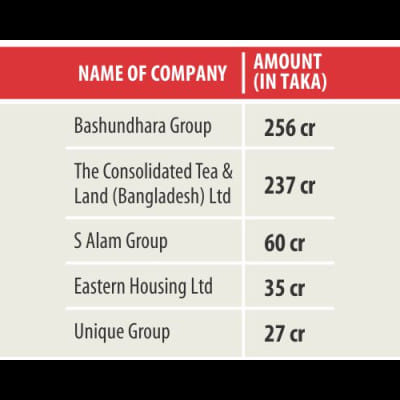It was illegal
The government has to return Tk 615 crore to 17 companies and several businesspeople that were forced to deposit the amount with Bangladesh Bank as tax on their alleged hidden money during the last caretaker government's tenure.
The companies and businesspeople yesterday won a legal battle at the Supreme Court, which rejected the BB's appeals against 11 High Court verdicts ordering the government to return the money.
A four-member SC bench headed by Chief Justice Surendra Kumar Sinha delivered the verdict after dismissing the 11 appeals.
Reasoning of the SC verdict will be known after the release of its full text.
The companies include S Alam Steel Ltd, Meghna Cement Mills Ltd, Bashundhara Paper Mills Ltd, Unique Hotel and Resort Ltd, Eastern Housing Ltd and the Consolidated Tea and Land (Bangladesh) Ltd.
Talking to The Daily Star, Ahsanul Karim, counsel for nine of the 17 companies, said that when and how the government would refund the money would be known after the apex court releases the full verdict.
Replying to a question, he said it is unclear whether the other companies that were also forced to deposit money the same way would get a refund.
If they decide to file petitions, it would be up to the court whether to accept those or not, he added.

Talking to reporters after the SC verdict, counsel for the central bank Barrister M Amir-Ul Islam said it was a matter to ponder how the government would give back so much money to the companies.
He said the government would decide whether it would seek review of the SC judgment.
Contacted, S Alam Group Chairman Saiful Alam said businesses were victims of circumstances and forced to pay the money during the last caretaker government's rule.
He said seven firms owned by his group had to deposit Tk 60 crore with the BB at that time.
If the money had been deposited with a bank, it would have doubled in 10 years, Saiful pointed out.
“If I could invest the money in setting up new industries, many new jobs would have been created, and the country could have got tax from import of raw materials and increased industrial output,” he said.
During the 2007-08 tenure of the army-backed caretaker government, an unprecedented anti-corruption crackdown was launched by army-led taskforces under the National Coordination Committee.
The joint forces investigating high-profile financial crimes had interrogated a number of corruption suspects and businesspeople.
At least 40 companies and individuals had to deposit more than Tk 1,200 crore with the central bank following the drive.
After an elected government took office in January 2009, the companies approached it on several occasions to get back their money. But the government didn't entertain their requests.
Later, the 17 companies filed writ petitions with the HC, seeking a refund with interest.
In their petitions to the HC, the companies alleged that they were threatened with serious consequences and asked to pay the government the amounts fixed by the then DGFI officials.
However, in its letters to the BB and the ministries concerned, the DGFI claimed that the companies willingly agreed to deposit the money as out-of-court settlement for not prosecuting them for their hidden money, according to the HC verdict.
During the hearing of the case, the BB informed the court that it had never demanded the said amount from the petitioners. Even the petitioners didn't submit any proof regarding the demand from the central bank.
The petitioners willingly issued pay orders of different banks and handed over those to the DGFI for depositing the proceeds in the government account, argued the BB counsel.
The HC delivered 11 verdicts on different dates between 2010 and 2015 and directed the government to return the money to the companies, declaring the money collection illegal.
In one of its judgments on August 24, 2010, the HC also asked the government to return the money and take legal action against those who forced the companies to deposit the money through abuse of power.
The HC, however, didn't entertain the petitioners' prayers for ordering the government to give them interest against the deposited money.
According to a rough estimate, interest on Tk 615 crore could be more than Tk 430 crore at an annual interest rate of seven percent for 10 years.
"If this court passed any order directing the authority to pay interest, in that case the same is to be made either only from the public fund or from the Consolidated Fund which is not permissible in the eye of law," said the HC judgement.
"For the wrong of some individual persons, the government namely the public fund cannot be subjected to any loss or injury.”
“There is no scope to allow any interest or excess money either from the consolidated fund or from the public fund as because the state is not responsible for such type of deposition of money as because the same is not in accordance with law,” it noted.
"The petitioners, in no circumstances, can claim any such interest or additional amount as because the same is not permitted by the Parliament," the HC said in the verdict following the writ petition filed by the Consolidated Tea and Land (Bangladesh) Ltd.
Analysing the related constitutional provision, the HC said a person cannot be subjected to pay a single penny without the sanction of parliament.
The HC declared unlawful the action of forcing the companies to deposit the money.


 For all latest news, follow The Daily Star's Google News channel.
For all latest news, follow The Daily Star's Google News channel. 



Comments